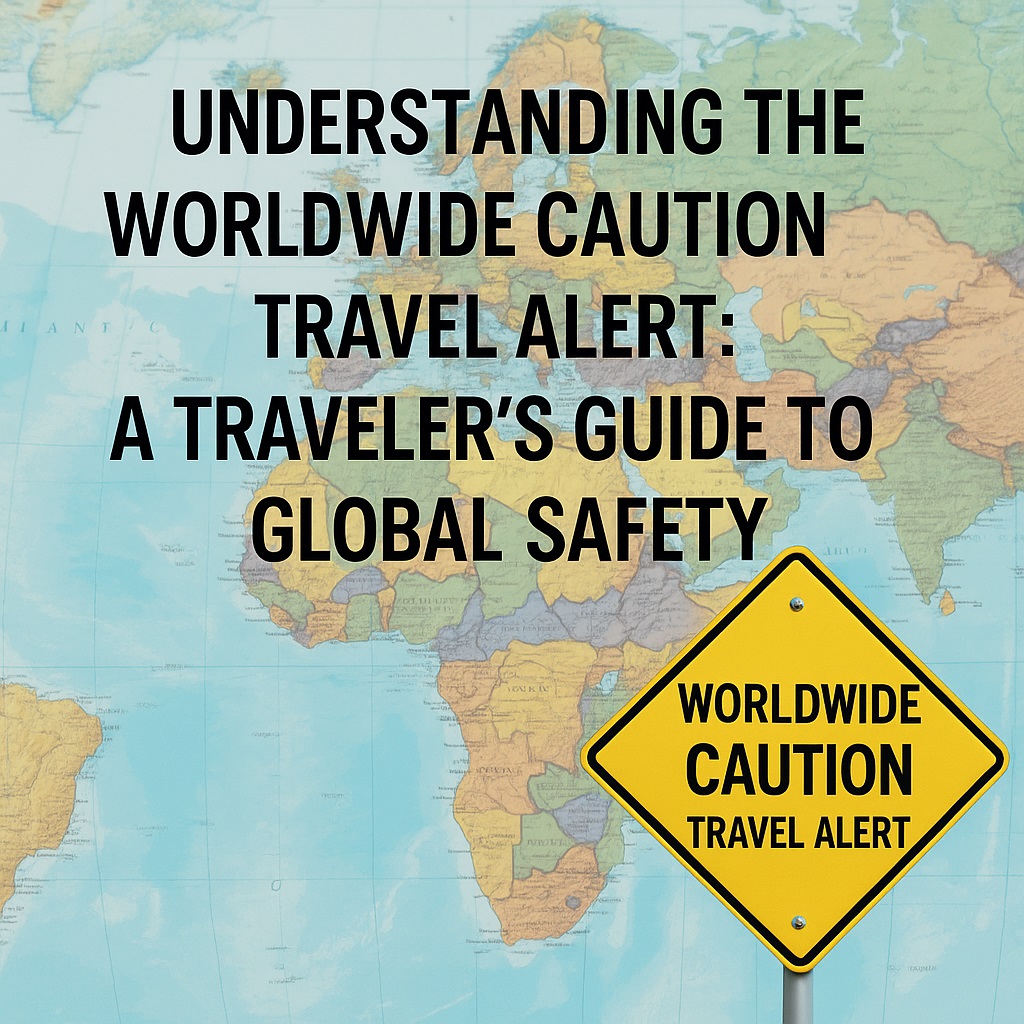
Introduction
Imagine planning your dream international trip, only to see news of a “Worldwide Caution Travel Alert.” What does it mean for your plans, and more importantly, your safety?
In a world increasingly affected by geopolitical tensions, terrorism, health crises, and natural disasters, global safety conditions can shift rapidly. Governments like the U.S. Department of State and the UK Foreign Office issue travel alerts to inform their citizens about these evolving risks.
This guide demystifies the concept of a Worldwide Caution Travel Alert. You’ll learn what it entails, how it differs from country-specific advisories, what it means for your travel plans, and how to stay safe and informed in times of global uncertainty.
What Exactly is a Worldwide Caution Travel Alert?
- Definition & Issuing Authority
A Worldwide Caution is a broad, non-country-specific travel warning issued by the U.S. Department of State. Unlike level-based advisories (Levels 1–4), which assess risk in specific countries, a Worldwide Caution warns of increased global threats that may affect multiple regions simultaneously. - Purpose of the Alert
These alerts are meant to:- Warn travelers about heightened global risks.
- Encourage vigilance and risk assessment.
- Inform citizens about emerging threats such as terrorism, pandemics, or large-scale unrest.
- Frequency and Duration
Issued periodically, depending on evolving global events, these cautions can remain active for weeks or months, depending on risk assessments.
Why Are Worldwide Cautions Issued? Common Triggers
- Global Security Threats
- Terrorism: Alerts are often issued when credible intelligence suggests a heightened risk of global terrorist attacks.
- Political Instability: Mass protests, coups, or civil unrest in multiple countries can prompt worldwide caution alerts.
- Health Crises
- Large-scale outbreaks like COVID-19 or Ebola.
- Informed by global health agencies such as the World Health Organization (WHO).
- Natural Disasters
- Widespread phenomena such as earthquakes or extreme weather systems affecting multiple countries.
- Specific Examples
- March 2020: Global alert issued amid rapid spread of COVID-19.
- November 2023: Worldwide Caution updated due to rising tensions and terrorist threats in various regions.
Implications for Travelers: What Does It Mean for You?
- Heightened Awareness, Not Always a Ban
- A Worldwide Caution is not a travel ban but a call for enhanced vigilance.
- Travelers must take more responsibility in assessing and mitigating risks.
- Travel Insurance
- Review policies for clauses on global advisories.
- Some insurers may offer “Cancel For Any Reason” (CFAR) coverage.
- 🔗 Understanding Travel Insurance: A Comprehensive Guide
- Reconsideration of Travel Plans
- Postpone or cancel non-essential trips to high-risk areas.
- Consult with tour operators or travel agencies for flexibility options.
- Impact on Flights & Tours
- Potential flight cancellations or route changes.
- Tours may be rescheduled or rerouted for safety.
Essential Steps for Travelers During a Global Alert
A. Stay Informed & Monitor Official Sources
- U.S. Department of State: Regular updates and advisories at travel.state.gov.
- Embassy/Consulate Websites: Location-specific safety details.
- STEP Program: Free service that registers U.S. citizens with local embassies. Enroll via step.state.gov.
- Reputable News Outlets: CNN, BBC, Reuters, etc. for real-time developments.
B. Enhance Personal Safety & Preparedness
- Local Security Review: Research security conditions in your destination.
- Maintain Low Profile: Avoid political demonstrations or risky areas.
- Emergency Contacts: Carry embassy contacts and personal emergency info.
- Copy Documents: Keep backup copies of key documents in separate locations.
- Communication Plan: Maintain regular contact with family back home.
C. Adjust Travel Itinerary
- Flexibility: Be ready to adapt plans quickly.
- Evacuation Plans: Know emergency exit strategies or relocation protocols.
- 🔗 International Travel Checklist: Preparing for Your Trip
Differentiating Worldwide Cautions from Specific Advisories
- Worldwide Caution: A general global alert advising increased vigilance across multiple regions.
- Country-Specific Advisories: Issued as Levels 1–4:
- Level 1: Exercise Normal Precautions
- Level 2: Exercise Increased Caution
- Level 3: Reconsider Travel
- Level 4: Do Not Travel
These can coexist with a Worldwide Caution and serve to focus on regional-specific risks.
Conclusion
A Worldwide Caution Travel Alert is a crucial informational tool in today’s volatile world. It doesn’t mean travel is forbidden—but it does signal a need for increased awareness, flexibility, and preparation.
Your best defenses as a traveler are information, readiness, and adaptability. Always stay updated with official advisories, enroll in relevant traveler programs, and prioritize your safety.
Article Info
- Author: The Pulsewire Team
- Published Date: June 22, 2025









